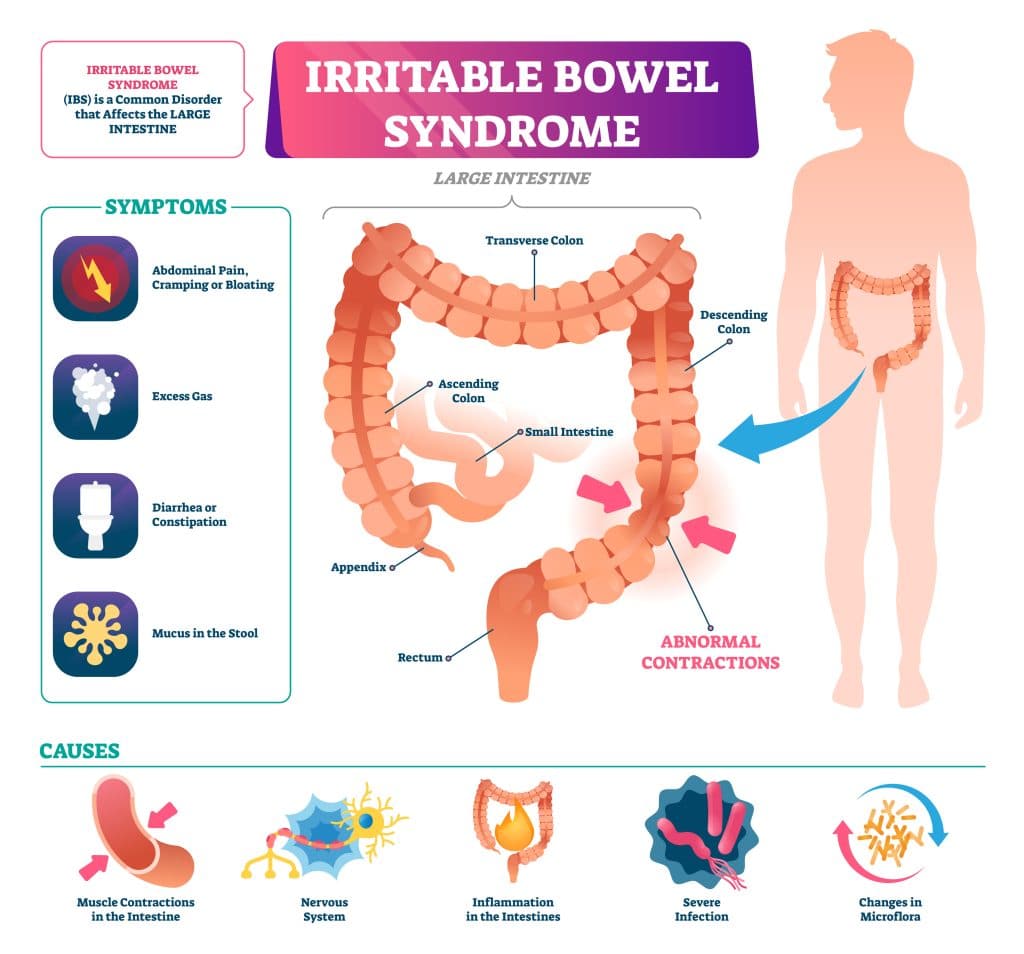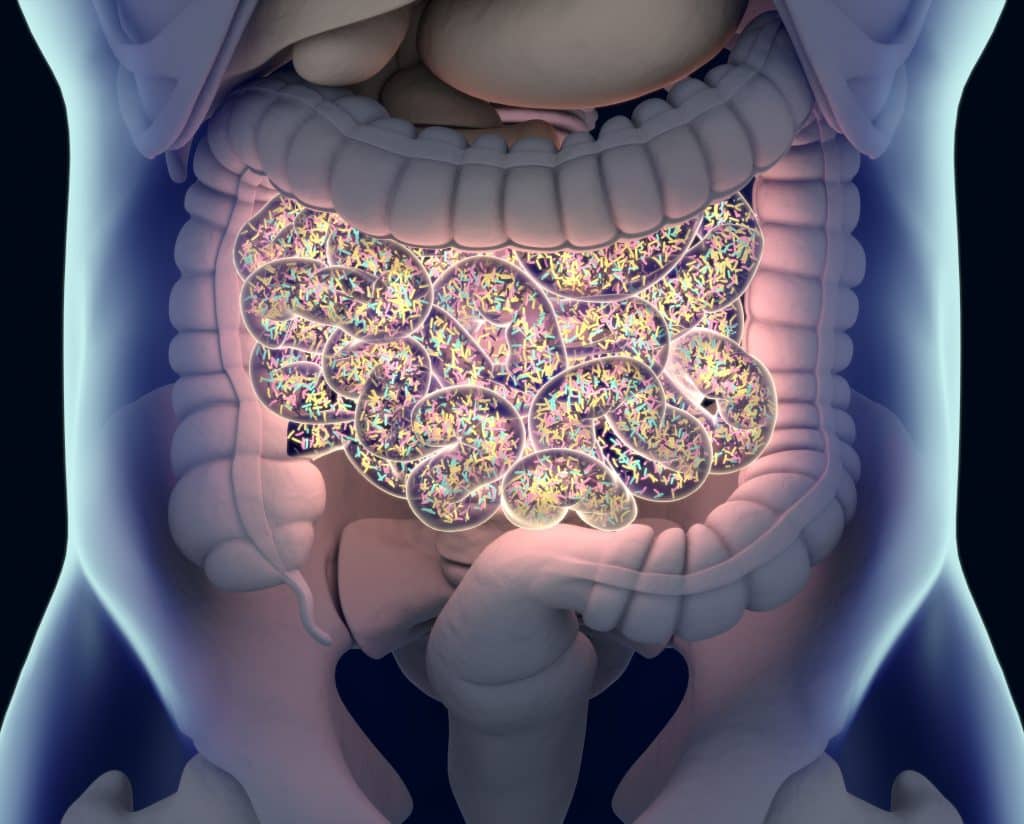What Causes Irritable Bowel Syndrome – And The 3-Part Solution
According to the medical community, what causes Irritable Bowel Syndrome (IBS) is still unknown, but it is believed to be linked to a variety of factors such as diet, stress, and hormones. Many people with IBS report having co-existing conditions such as anxiety or depression.1
Irritable Bowel Syndrome is a chronic, functional gastrointestinal disorder that affects up to 21% of the population worldwide. It is characterized by abdominal pain, bloating, cramping, diarrhea, constipation, and other unpleasant symptoms. Although IBS is not life-threatening, it can significantly impact the quality of life due to its uncomfortable nature.2
What Causes Irritable Bowel Syndrome
IBS is an autoimmune condition, that stems from the body’s own immune system attacking the digestive tract and causing inflammation. This inflammation can lead to changes in the lining of the intestine, resulting in symptoms like abdominal pain and diarrhea.
Irritable Bowel Syndrome is a broad category of various diseases like SIBO, Celiac Disease, Crohn’s Disease, Ulcerative Colitis, and Chronic Fatigue Syndrome that are caused by an imbalance in gut health. An imbalanced microbiome, or the bacterial environment in your digestive system, can cause a wide range of issues from gut symptoms such as abdominal pain, bloating, and constipation to systemic problems like fatigue and joint pain. Gut health is an important factor in your overall health and is directly linked to your immune system.3
Like all other autoimmune conditions, IBS is driven by inflammation.4

Inflammation Causes Irritable Bowel Syndrome At The Core
Chronic inflammation can be caused by a range of factors such as autoimmune diseases, allergies, and environmental toxins.5 In this case, the inflammation does not resolve until the underlying cause is treated. Since inflammation causes irritable bowel syndrome, we must address the cause of inflammation if we want to achieve relief.
What Causes Irritable Bowel Syndrome – The Three-Legged Stool
IBS is caused by a combination of three factors that lead to immune system dysregulation. The “three-legged stool” concept is an effective way of understanding the underlying cause of Irritable Bowel Syndrome, which involves the complex interaction between stressors, gut health, and DNA methylation. By making lifestyle changes, it is possible to manage, and even put an end to IBS and all other autoimmune conditions.
A three-legged stool is only stable when all of its legs are functioning correctly. Similarly, a strong and healthy person requires three key components to maintain their wellness, specifically, limited toxin exposure, a healthy microbiome, and ideal genetic expression. When any one of these elements is missing or inadequate, a person’s overall health will suffer as a result. Therefore, it is important to ensure that all three components are in balance for optimal health.
What Causes Irritable Bowel Syndrome – Leg #1 – Inflammation Driven By Stressors
Stressors are factors that can have a significant impact on us in various ways. Our bodies are equipped to handle the stress from these factors, however, when the body is confronted with too much stress, it may manifest into physical symptoms.
A useful analogy for understanding how our bodies react to stress is the overflowing bucket. Each individual stressor can be thought of as a drop of water that is slowly filling the bucket. As more and more stressors accumulate, the bucket eventually begins to overflow. This can be likened to autoimmune conditions like IBS where our body’s capacity for handling stress has been surpassed.

What Causes Irritable Bowel Syndrome – Stressors
Some of the most common sources of stressors are an unhealthy diet, a sedentary lifestyle, imbalances in minerals, pressures from work and other activities, anxiety and depression, as well as emotional traumas. In addition to these, we are also exposed to chemical toxins from many different sources which can further add to our stress levels.
In the case of irritable bowel syndrome, grains, legumes, dairy products, sugar, and potatoes can stress the body, causing irritable bowel syndrome. The first line of defense against IBS is to avoid wheat products, products made from cow’s milk, vegetables like broccoli, cabbage, cauliflower, Brussels sprouts, radish, corn, tomatoes, eggs, citrus fruits, and yeast-containing products.6 Additionally, consuming a diet that is overly rich in protein can contribute to IBS.7
Interestingly, individuals with IBS aren’t actually allergic to these food products. However, when consumed, the immune system inadvertently triggers mast cells that in turn release histamine. Histamines are what cause the discomfort and therefore, blocking histamine has been shown to improve the symptoms associated with IBS.
Typically, food does not trigger the immune system, but people who suffer from IBS have an immune reaction to certain foods. In most cases, IBS becomes diagnosed after an infection in the gastrointestinal system. In other words, the initial stressor, the gastrointestinal infection, leads the body to release histamines when certain foods are consumed.8

Stress Causes Irritable Bowel Syndrome
Stress and IBS can often be a difficult cycle, with one exacerbating the other. Stress can increase symptoms of IBS while living with IBS can add to anxiety and stress levels.9 It is important to find ways to break this cycle in order to reduce negative physical and emotional effects.
Making lifestyle changes that help reduce stress and manage IBS symptoms is an important part of managing both conditions. These can include practicing relaxation techniques such as deep breathing and mindfulness meditation to help manage stress levels. Exercising regularly can reduce stress levels and improve overall health.
It is important for people living with IBS along with significant stress to prioritize self-care. Taking time to relax, doing activities that bring joy, and getting adequate rest can help to reduce the negative effects of both conditions.
Hormone Imbalance Causes Irritable Bowel Syndrome
Hormones can play an important role in the development and maintenance of Irritable Bowel Syndrome. Estrogen has been linked to IBS. Studies suggest that fluctuations of estrogen may result in changes in gastrointestinal motility, pain perception, and inflammation in people with IBS.10 Additionally, hormones often interact with other factors such as stress and diet which can influence the severity of IBS symptoms.
What Is The Main Cause Of Hormone Disorder?
Inflammation has been identified as the main cause of hormone disorders. When inflammation is chronic, it can interfere with normal hormonal production and regulation, leading to an imbalance that can manifest itself as a variety of symptoms.11
Inflammation Leads To Hormone Resistance
One consequence of chronic inflammation is hormone resistance, a condition in which hormones become less effective in regulating the body’s processes. This phenomenon has been linked to a variety of different health conditions, including obesity, thyroid disorder, and metabolic syndrome.12
Chronic inflammation causes changes in the production and regulation of hormones. For example, pro-inflammatory cytokines, the molecules released during inflammation, have been shown to interfere with the body’s ability to produce and respond to insulin, a hormone that helps regulate blood sugar levels.13
Chronic inflammation can lead to hormonal imbalances that interfere with metabolism and energy balance. For example, inflammation can lead to increased cortisol levels, a hormone produced in response to stress, which is often linked to weight gain. This is due in part to cortisol’s ability to alter energy metabolism and lipid storage in the body.14

What Causes Irritable Bowel Syndrome
As you can see, inflammation causes irritable bowel syndrome, while also being the underlying factor behind hormone disruption and hormone resistance. This leads to cortisol upregulation, which increases stress levels, and exacerbates the symptoms of irritable bowel syndrome.
So again, we must target exactly what is causing inflammation and then downregulate the inflammatory cycle if we ever wish to receive relief from IBS.
Read more about how to reduce inflammation and receive relief from IBS and other autoimmune conditions.
What Causes Irritable Bowel Syndrome – Leg #2 – Microbiome
Certain pathogens have been associated with the development of IBS, as they lead to changes in the gut microbiome. The presence of these pathogens leads to both diarrhea and constipation.15
The best way to improve the microbiome is through lifestyle changes. Regular exercise and following a diet that consists of foods that contain high-fat, low carbohydrates, and moderate protein, such as my Cellular Healing Diet, along with intermittent fasting and extended water fasts, can all have positive impacts on gut health.16 These modifications can make a big difference in your overall health and well-being.

What Causes Irritable Bowel Syndrome – Leg #3 – Genetics
Genetic factors play a role in the development of irritable bowel syndrome. Studies have shown that IBS can run in families, and scientific research has identified several genes that may increase a person’s susceptibility to developing the disorder. In particular, mutations in the brain-gut axis, otherwise known as the communication pathway between the brain and intestines, play an important role in IBS.17 18
You may think that if IBS is genetic in nature there isn’t much you can do about it. However, being predisposed to developing IBS or other genetic conditions doesn’t necessarily mean that you will develop them. This is because epigenetic methylation determines which phenotypes of your DNA are expressed and turned off.19
In the presence of adequate methyl groups that initiate ideal epigenetic expression, IBS genes will remain switched off.20 However, a body loaded with toxins must use methyl groups to deal with the side effects of this toxicity first and foremost.21 If we can remove those toxins, downregulate inflammation, and use methyl donor supplements, we possess sufficient methyl groups to facilitate ideal genetic phenotypes and turn off undesirable genetic traits like IBS.
What Causes Irritable Bowel Syndrome
At the core, inflammation causes irritable bowel syndrome. The key to receiving relief from IBS is to remove the source of inflammation and downregulate inflammation. Then, improve microbiome health through lifestyle changes and improve epigenetic methylation with methyl donor supplements for lasting relief from autoimmune conditions.
Read more about stopping inflammation.
References
1 Irritable bowel syndrome – Symptoms and causes – Mayo Clinic. (2022, November 2). Mayo Clinic. https://www.mayoclinic.org/diseases-conditions/irritable-bowel-syndrome/symptoms-causes/syc-20360016
2 Chey, W. D., Kurlander, J., & Eswaran, S. (2015). Irritable bowel syndrome: a clinical review. JAMA, 313(9), 949–958. https://doi.org/10.1001/jama.2015.0954
3 Clinical Trials for Irritable Bowel Syndrome. (2022, July 23). National Institute of Diabetes and Digestive and Kidney Diseases. https://www.niddk.nih.gov/health-information/digestive-diseases/irritable-bowel-syndrome/clinical-trials
4 Al Bander, Z., Nitert, M. D., Mousa, A., & Naderpoor, N. (2020). The Gut Microbiota and Inflammation: An Overview. International journal of environmental research and public health, 17(20), 7618. https://doi.org/10.3390/ijerph17207618
5 Pahwa R, Goyal A, Jialal I. Chronic Inflammation. [Updated 2022 Aug 8]. In: StatPearls [Internet]. Treasure Island (FL): StatPearls Publishing; 2022 Jan-. Available from: https://www.ncbi.nlm.nih.gov/books/NBK493173/
6 Heaton KW, Thornton JR, Emmett PM. Treatment of Crohn’s disease with an unrefined-carbohydrate, fiber-rich diet. Br Med J. 1979;2:764–766.
7 Roediger WE, Moore J, Babidge W. Colonic sulfide in pathogenesis and treatment of ulcerative colitis. Dig Dis Sci. 1997;42:1571–1579.
8 KU Leuven. (2021, January 17). Scientists reveal mechanism that causes irritable bowel syndrome. ScienceDaily. Retrieved February 27, 2023 from www.sciencedaily.com/releases/2021/01/210117132238.htm
9 Qin, H. Y., Cheng, C. W., Tang, X. D., & Bian, Z. X. (2014). Impact of psychological stress on irritable bowel syndrome. World journal of gastroenterology, 20(39), 14126–14131. https://doi.org/10.3748/wjg.v20.i39.14126
10 Mulak, A., Taché, Y., & Larauche, M. (2014). Sex hormones in the modulation of irritable bowel syndrome. World journal of gastroenterology, 20(10), 2433–2448. https://doi.org/10.3748/wjg.v20.i10.2433
11 InformedHealth.org [Internet]. Cologne, Germany: Institute for Quality and Efficiency in Health Care (IQWiG); 2006-. What is an inflammation? 2010 Nov 23 [Updated 2018 Feb 22]. Available from: https://www.ncbi.nlm.nih.gov/books/NBK279298/
12 Rana S. V. (2014). Perspectives in endocrine toxicity of heavy metals–a review. Biological trace element research, 160(1), 1–14. https://doi.org/10.1007/s12011-014-0023-7
13 King G. L. (2008). The role of inflammatory cytokines in diabetes and its complications. Journal of periodontology, 79(8 Suppl), 1527–1534. https://doi.org/10.1902/jop.2008.080246
14 Hewagalamulage, S. D., Lee, T. K., Clarke, I. J., & Henry, B. A. (2016). Stress, cortisol, and obesity: a role for cortisol responsiveness in identifying individuals prone to obesity. Domestic animal endocrinology, 56 Suppl, S112–S120. https://doi.org/10.1016/j.domaniend.2016.03.004
15 Pimentel, M., & Lembo, A. (2020). Microbiome and Its Role in Irritable Bowel Syndrome. Digestive diseases and sciences, 65(3), 829–839. https://doi.org/10.1007/s10620-020-06109-5
16 Larrick, J. W., Mendelsohn, A. R., & Larrick, J. W. (2021). Beneficial Gut Microbiome Remodeled During Intermittent Fasting in Humans. Rejuvenation research, 24(3), 234–237. https://doi.org/10.1089/rej.2021.0025
17 Henström, M., & D’Amato, M. (2016). Genetics of irritable bowel syndrome. Molecular and cellular pediatrics, 3(1), 7. https://doi.org/10.1186/s40348-016-0038-6
18 Ancona, A., Petito, C., Iavarone, I., Petito, V., Galasso, L., Leonetti, A., Turchini, L., Belella, D., Ferrarrese, D., Addolorato, G., Armuzzi, A., Gasbarrini, A., & Scaldaferri, F. (2021). The gut-brain axis in irritable bowel syndrome and inflammatory bowel disease. Digestive and liver disease : official journal of the Italian Society of Gastroenterology and the Italian Association for the Study of the Liver, 53(3), 298–305. https://doi.org/10.1016/j.dld.2020.11.026
19 “What Is Epigenetics?” Centers for Disease Control and Prevention, Centers for Disease Control and Prevention, 3 Aug. 2020, www.cdc.gov/genomics/disease/epigenetics.htm.
20 Scacheri, Cheryl. “Genetic Variation and Disease: GWAS.” Nature News, Nature Publishing Group, www.nature.com/scitable/topicpage/genetic-variation-and-disease-gwas-682/.
21 Ridley, W. P., Dizikes, L., Cheh, A., & Wood, J. M. (1977). Recent studies on biomethylation and demethylation of toxic elements. Environmental health perspectives, 19, 43–46. https://doi.org/10.1289/ehp.771943




